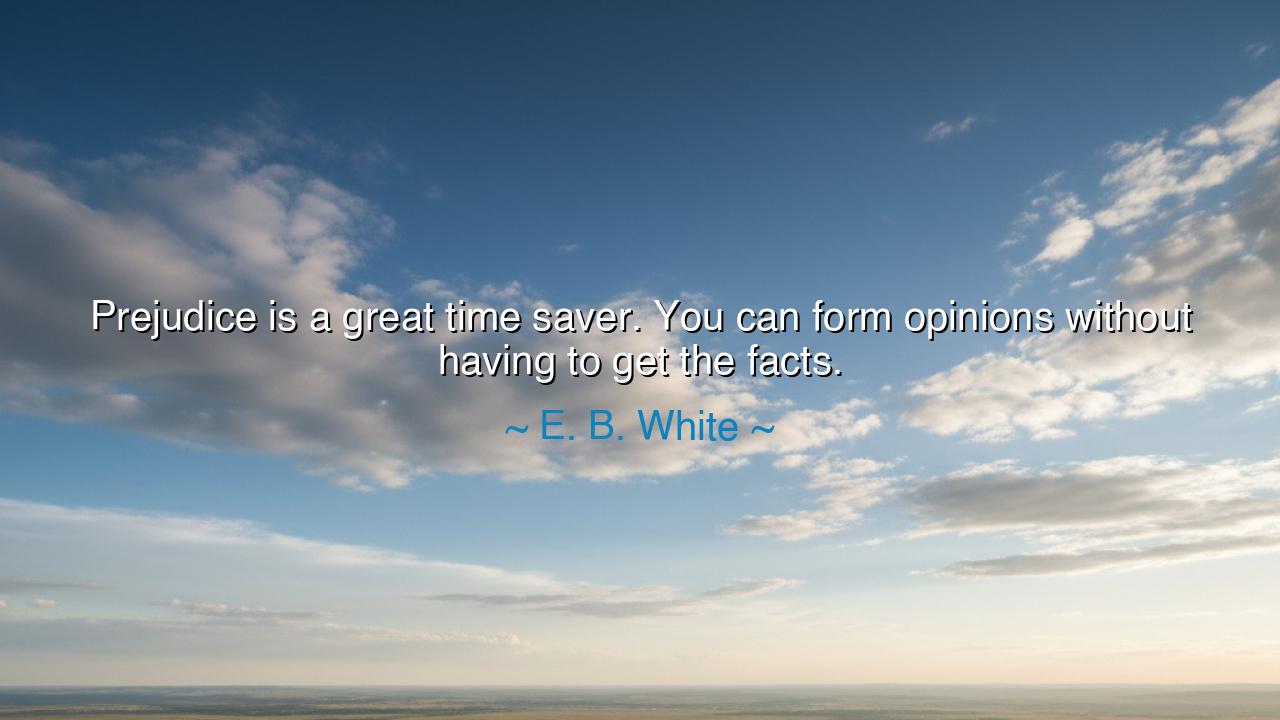
Prejudice is a great time saver. You can form opinions without
Prejudice is a great time saver. You can form opinions without having to get the facts.






Listen, O children of the earth, to the words of E. B. White, who speaks with both clarity and a deep understanding of the human condition: "Prejudice is a great time saver. You can form opinions without having to get the facts." These words, though spoken with the sharpness of humor, reveal a profound truth about the nature of prejudice and the danger of forming judgments without seeking the truth. White’s reflection serves as a reminder of how easy it is to embrace prejudices—opinions formed without evidence, understanding, or the willingness to engage with the full complexity of a person, situation, or idea. Prejudice, in this sense, is not merely a flaw of character, but a shortcut—a way of avoiding the difficult work of truly understanding the world.
In the ancient world, the philosophers taught that knowledge and wisdom come only through questioning, learning, and reflection. Socrates famously said, "The unexamined life is not worth living," for he believed that true understanding could only arise from careful inquiry. To form judgments without understanding, he warned, is to live a life of ignorance, not wisdom. White’s quote echoes this ancient wisdom, as it cautions us against the temptation of snap judgments—those that are easy, but ultimately empty of truth. Prejudice, as White points out, is a shortcut, a way to avoid the hard work of seeking the truth.
Consider the story of the philosopher Diogenes, known for his eccentric behavior and his rejection of societal norms. Diogenes, though a man of extreme simplicity, often faced prejudices from those who misunderstood his ways. Yet, he did not seek the approval of others, for he understood that true wisdom comes not from conforming to societal expectations, but from living according to one’s own truth. Diogenes did not allow the prejudices of others to influence his life. His example teaches us that prejudices are often born of misunderstanding, and that truth can only be found when we resist the urge to judge others based on superficial ideas.
In the same way, White’s words urge us to be wary of the habitual formation of opinions without facts or context. Prejudice saves time, but it does so at the expense of truth. Just as the ancients sought to understand the world through reason and philosophy, we too must strive to see beyond the surface and embrace a deeper understanding of those around us. When we form judgments based on prejudice, we not only rob ourselves of true knowledge, but we also perpetuate harmful stereotypes that divide and separate us from one another. The lesson is clear: truth requires time, patience, and the willingness to look deeper.
Consider the civil rights movement of the 20th century, when prejudices against Black Americans were widespread and deeply ingrained in society. The journey of Martin Luther King Jr., Rosa Parks, and countless others was not just about seeking freedom, but about challenging the prejudices that had been accepted as truth by so many. King, with his message of nonviolent resistance, did not seek to destroy the prejudices of others through force, but to reveal the truth through action, love, and understanding. He understood that the greatest way to challenge prejudice was to change hearts and minds—to offer a new narrative that could overcome the false judgments of the past.
The lesson, O children of the earth, is one of patience, understanding, and wisdom. Prejudice may seem like a time-saver, an easy way to avoid the complexity of the world, but it is ultimately a dangerous shortcut. It distorts our perception, limits our understanding, and prevents us from truly connecting with the richness of the human experience. To understand the world, we must first acknowledge our own biases and then work to see beyond them—to engage with the fullness of truth, not just the convenience of what we already believe.
In your own lives, O seekers of wisdom, let this be a call to examine your own judgments and the prejudices you may unknowingly hold. Do not fall prey to the easy road of forming opinions without knowledge, for it is through understanding and reflection that true wisdom is born. Challenge yourself to engage with the facts, to see people not through the lens of assumptions, but through the lens of empathy and inquiry. Like the great philosophers of old, strive to look deeper into the heart of every matter, and resist the urge to settle for shallow judgments.
Remember, O children of the earth, that the path to wisdom is not easy, but it is always worth the effort. Prejudices may save time, but they blind us to the beauty and truth that exists beyond our assumptions. Choose to question and to seek understanding, for in this way, you will find the richness of life, not as a series of shallow judgments, but as a vast and beautiful tapestry of truth and connection.






AAdministratorAdministrator
Welcome, honored guests. Please leave a comment, we will respond soon